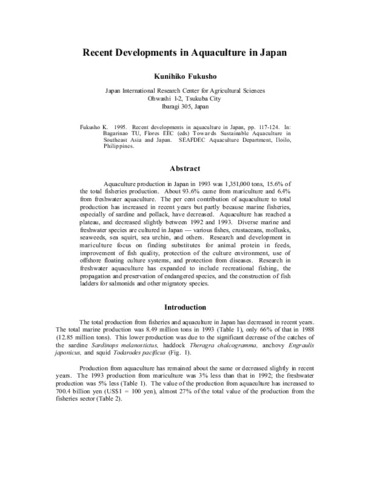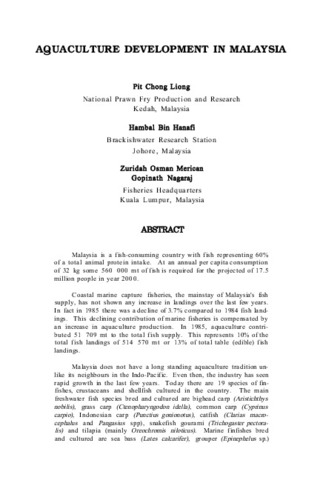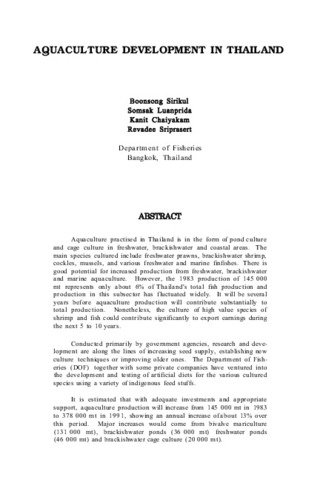| dc.contributor.author | Yashiro, R. | |
| dc.contributor.author | Limthammahisorn, S. | |
| dc.contributor.author | Suntornratana, U. | |
| dc.contributor.editor | Acosta, Belen O. | |
| dc.contributor.editor | Coloso, Relicardo M. | |
| dc.contributor.editor | de Jesus-Ayson, Evelyn Grace T. | |
| dc.contributor.editor | Toledo, Joebert D. | |
| dc.date.accessioned | 2013-12-06T02:25:16Z | |
| dc.date.available | 2013-12-06T02:25:16Z | |
| dc.date.issued | 2011 | |
| dc.identifier.citation | Yashiro, R., Limthammahisorn, S., & Suntornratana, U. (2011). Status of implementation of the resolution and plan of action on aquaculture in Thailand. In B. O. Acosta, R. M. Coloso, E. G. T. de Jesus-Ayson, & J. D. Toledo (Eds.), Sustainable aquaculture development for food security in Southeast Asia towards 2020. Proceedings of the Regional Technical Consultation on Sustainable Aquaculture Development in Southeast Asia Towards 2020 (pp. 115-128). Tigbauan, Iloilo, Philippines: SEAFDEC Aquaculture Department. | en |
| dc.identifier.isbn | 9789718511992 | |
| dc.identifier.uri | http://hdl.handle.net/10862/1831 | |
| dc.description.abstract | Aquaculture development in Thailand is based on the principle of balance and sustainability. The missions of aquaculture development include the development of fishery products from aquaculture to achieve international quality standards, enhanced sustainability of fishery products from aquaculture, stock enhancement of aquatic resources, and development of research and technology for aquaculture. The national directive aims at increasing production by 5% per year to provide at least 30 kg per person per year of food fish consumption. In recent years, Thailand aquaculture technology developments have increased not only in productivity but also in terms of quality and safety of products throughout the production line. Its development has become more harmonious with the natural environment and more consistent with socioeconomic development.
With regard to supply of quality seeds on consistent and sustainable basis, the Department of Fisheries (DoF) supports both the government and private sector hatcheries to produce quality seeds. The Good aquaculture practices (GAPs) and Code of conduct (CoC) which comply with the environmental theme are also applied. Research for broodstock development is aimed at enhancing reproduction by nutritional manipulation and closed recycling water system for broodstock. Promotion of domestication and research in genetic manipulation for broodstock are practiced.
Moreover, the regulations of feed quality control have been performed according to the Feed quality act (1982). The Good manufacture practices (GMPs) and HACCP for aqua-feed manufacturing are promoted as voluntary. Currently, the use of ingredients for bio-energy production is emerging in aqua-feed industry. Research to develop suitable alternative protein sources to reduce the use of fish meal is on-going and is being supported by DoF. The expanded scientific information and technology development designed for aquaculture offer significant benefits to both producers and consumers by enhancing the production efficiency and quality of cultivated aquatic species with appropriate culture practices. | en |
| dc.language.iso | en | en |
| dc.publisher | Aquaculture Department, Southeast Asian Fisheries Development Center | en |
| dc.subject | Thailand | en |
| dc.title | Status of implementation of the resolution and plan of action on aquaculture in Thailand. | en |
| dc.type | Conference paper | en |
| dc.citation.spage | 115 | |
| dc.citation.epage | 128 | |
| dc.subject.asfa | aquaculture | en |
| dc.subject.asfa | aquaculture development | en |
| dc.subject.asfa | aquaculture economics | en |
| dc.subject.asfa | breeding | en |
| dc.subject.asfa | culture effects | en |
| dc.subject.asfa | feeds | en |
| dc.subject.asfa | fish culture | en |
| dc.subject.asfa | fish diseases | en |
| dc.subject.asfa | Fish meal | en |
| dc.subject.asfa | food security | en |
| dc.subject.asfa | national planning | en |
| dc.subject.asfa | seed (aquaculture) | en |
| dc.subject.asfa | sustainability | en |
| dc.subject.asfa | certification | en |
| dc.subject.asfa | environmental impact | en |
| dc.subject.asfa | food fish | en |
| dc.subject.asfa | socioeconomic aspects | en |
| dc.citation.conferenceTitle | Sustainable aquaculture development for food security in Southeast Asia towards 2020. Proceedings of the Regional Technical Consultation on Sustainable Aquaculture Development in Southeast Asia Towards 2020 | en |



